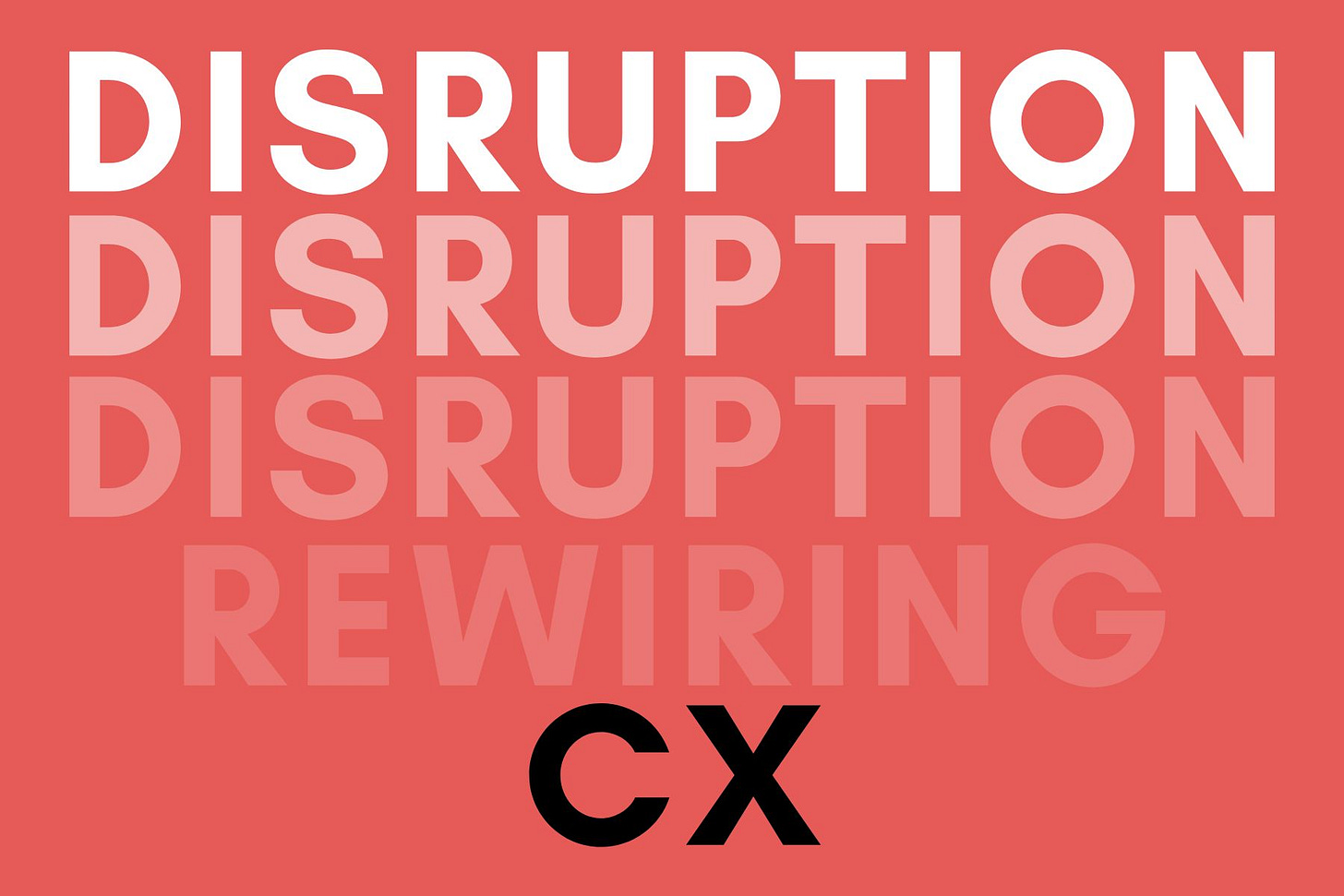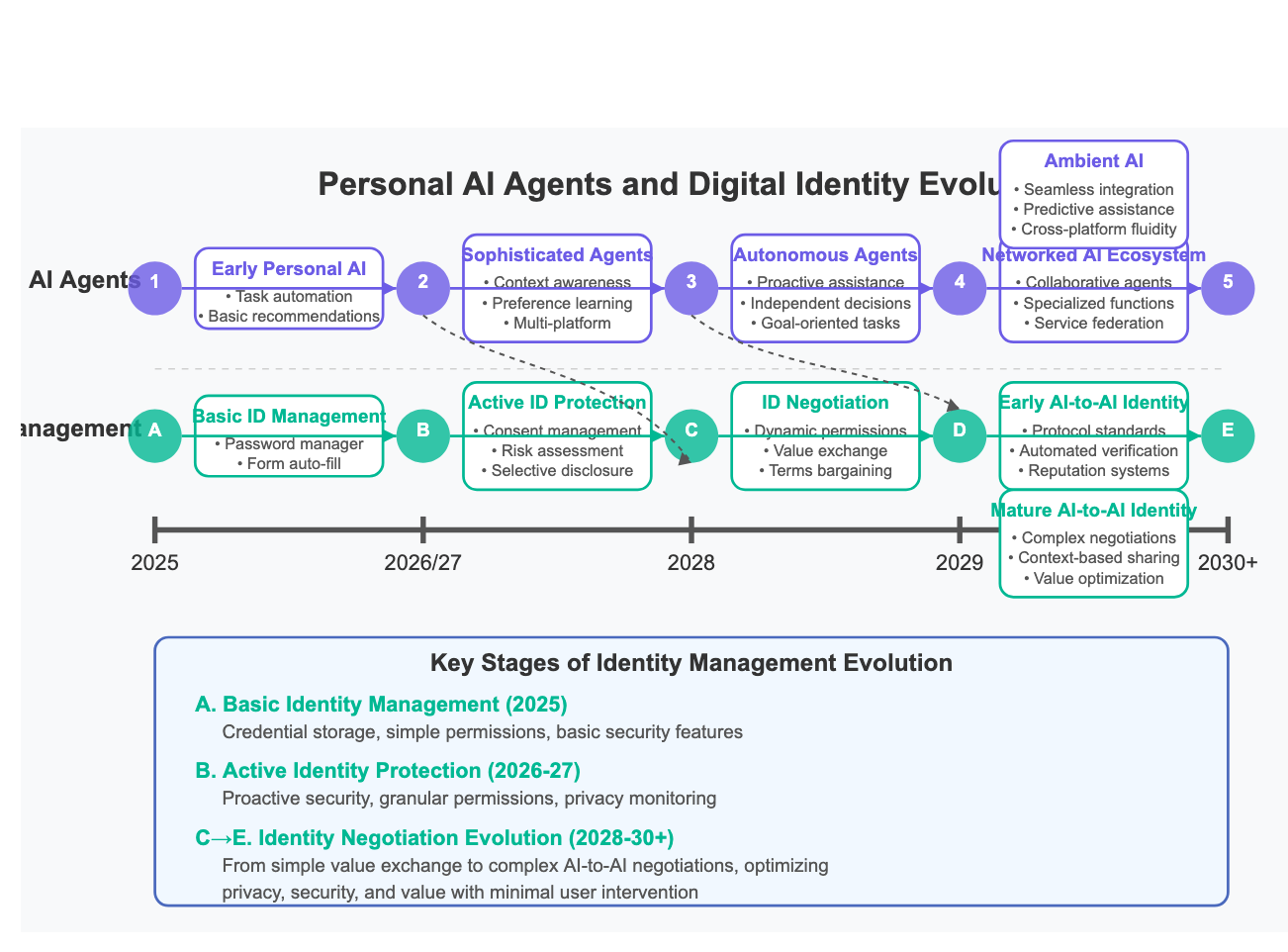Hello!
Welcome to your midweek UNCX.
I unpack disruption to CX playbooks through the lens of consumer behaviours, tech, marketing, and branding. (And I curate the best reads, videos, and ads from the last few days on weekends.)
If you’re not signed up, why not subscribe now? It’s free!
Takeaway
Digital identity empowers the consumer and impacts data, marketing, and trust.
Last week, I wrote about the shopping and buying revolution with the coming of personal consumer AI agents.
This week, the disruption continues with consumer (citizen) Digital Identities.
Digital Identities for Consumers
Digital identities for consumers are a revolution in how individuals are represented, authenticated, and will interact online.
Let’s break this down.
What are They?
Digital identities are the online representation of an individual’s identity, including:
Verified credentials and attributes
Authentication mechanisms
Identity assertions across platforms
Reputation and history
Personal data collection
Digital preferences and behaviours
These digital identity systems will go beyond simple username/password combinations to comprehensive, portable frameworks.
They can also follow consumers across services and platforms. Customers will love this, as long as they can trust it.
When Will They Come?
Digital identities are evolving in stages:
Present Day (2025): We're currently in a transitional phase with:
Fragmented identity solutions
Password managers and biometric authentication
Single sign-on options (Google, Apple, Facebook)
Early decentralised identity experiments
Near Term (2025-2026):
Digital identity wallets from major platforms
More government-issued digital IDs
Integration of verifiable credentials standards
Early adoption of personal AI identity management
Medium Term (2027-2028):
Cross-platform identity portability
Wider acceptance of decentralised identifiers
AI-managed identity permissions becoming common
Physical-digital identity convergence
Longer Term (2029-2030):
Mature digital identity ecosystems
AI-to-AI identity negotiation
Seamless authentication across contexts
Identity as fundamental digital infrastructure
The Impact on Customer Experience (Hint: the customer will love it once they trust it)
Reduced Friction: Eliminating repetitive sign-ups and form-filling
Contextual Authentication: Moving beyond passwords to seamless verification
Consistent Cross-Channel Experience: Maintaining Preferences Across Touchpoints
Selective Disclosure: Sharing only necessary information for each interaction
Trust Transparency: Clear visibility into how identity data is used
The Impact on Marketing
The marketing landscape will have to shift:
Consent-Based Engagement: Moving from tracking to permissioned interaction
Authenticated Relationships: Direct connections replacing anonymous tracking
Value Exchange Clarity: Explicit benefits for identity sharing
Trust as Differentiator: Brand reputation for responsible data practices
AI-Mediated Brand Relationships: Engagement through personal AI interfaces
Impact on Marketing Data
Data collection will change.
Quality Over Quantity: Fewer but higher-quality authenticated data points
Zero-Party Data Focus: Explicitly shared preferences over inferred behaviours
Federated Analytics: Gaining insights without raw data transfer
Identity Graph Transformation: From tracking-based to permission-based connections
Attribute-Based Targeting: Using verified claims versus behavioural proxies
Impact on Consumer Privacy
Great for consumers by enhancing privacy protection.
Granular Control: Attribute-level sharing permissions
Revocable Access: Ability to withdraw consent and data
Transparency Mechanisms: Clear audit trails of data access and usage
Reduced Data Honeypots: Decreased centralised repositories
Privacy by Design: Identity systems built with privacy as a core principle
Impact on Personal AI Agents
AI agents will manage digital identity:
Identity Intermediation: AI becomes the gatekeeper to personal data
Permission Management: Automated consent decisions based on user preferences
Terms Negotiation: AI-to-AI bargaining for fair data exchanges
Risk Analysis: Continuous evaluation of identity disclosure risks
Brand Relationship Management: AI maintains branded relationships
Context-Aware Privacy: Dynamic privacy settings based on situation
And my guess for the timeline for our capable personal AI assistants managing digital identity is:
Basic features: 2025-2026
Sophisticated agents: 2027-2028
AI-to-AI identity negotiation: 2029-2030
Below, my visual of a timeline shows the evolution of personal AI consumer agents and how they'll merge with digital identities over time. The diagram has two parallel tracks:
Top Track (Purple): Shows the evolution of personal AI agents themselves
Bottom Track (Green): Shows how these agents will manage digital identities
Key milestones in the timeline include:
Personal AI Agent Evolution:
2025: Early Personal AI - Basic task automation and recommendations
2026/27: Sophisticated Agents - Context awareness, preference learning, and multi-platform capabilities
2028: Autonomous Agents - Proactive assistance, independent decisions, and goal-oriented task completion
2029: Networked AI Ecosystem - Collaborative agents with specialised functions and service federation
2030+: Ambient AI - Seamless integration, predictive assistance, and cross-platform fluidity
Identity Management Evolution:
A. 2025: Basic ID Management - Password management and form auto-filling
B. 2026/27: Active ID Protection - Consent management, risk assessment, and selective disclosure
C. 2028: ID Negotiation - Dynamic permissions, value exchange, and terms bargaining
D. 2029: Early AI-to-AI Identity - Protocol standards, automated verification, and reputation systems
E. 2030+: Mature AI-to-AI Identity - Complex negotiations, context-based sharing, and value optimisation
Digital identities are evolving from today's fragmented systems to comprehensive frameworks that will transform consumer experiences by 2030.
By 2026-27, sophisticated personal AI agents will be managing identity permissions and consent.
Around 2028-29, these agents will negotiate dynamic permissions and data value exchanges on consumers' behalf.
By 2030, mature AI-to-AI identity negotiations will enable complex, contextual data sharing with minimal user intervention, balancing privacy, personalization, and value while transforming marketing from tracking-based to permission-based engagement.
But, (it’s worth saying again), trust will be the key adoption driver.
Some elements will depend on tech, some on user experience, and some on business models, but much will depend on society and culture.
The role of government, the citizens' relationship with the state, and whether and how businesses and institutions are trusted.
Edelman’s Trust Barometer might be an interesting future signal for how quickly digital ID wallets mature.
Some Brands May Struggle to Adapt
Brands won’t have access to first-party data.
Personalisation will require explicit consumer permission.
Dynamic consent models will become the norm.
Without direct consumer data, brands will lose a key ability to predict and personalise.
Advertising will become ineffective as AI agents block irrelevant content.
CRM strategies will become obsolete, requiring brands to build direct, value-driven relationships.
Key Implication 1: We’ll need to provide compelling reasons for consumers to grant us data access—such as exclusive experiences, AI-friendly rewards, or hyper-personalised benefits.
Key Implication 2: Consumer trust will be a cornerstone and significantly influence the adoption of Personal AI agents and digital wallets, particularly when sensitive personal data is involved. The perceived trustworthiness of these technologies and the entities providing them will be critical in overcoming privacy concerns and fostering widespread use. Read the Edelman 2025 Trust Report, which states that trust has “metastasised into grievance” and that most believe organisations “harm them and serve narrow interests”.
So things are getting rather interesting regarding how we’ll talk to the customer.
Just yesterday, they filled out endless forms and clicked ‘accept all cookies’ without a second thought. But the future of how brands and customers interact will be very different, thanks to AI agents managing our digital bits and pieces.
Personal AI agents will be the customers' digital champions, looking out for their best interests when sharing information with us.
They’ll be wanting to get a fair deal for their data.
AI-to-AI identity negotiations will feel like automated haggling in a digital marketplace.
It means a profound shift in how we access customer data, personalise experiences, and build trust.
We’ll no longer hoover up online activity.
The consumer’s AI agent will be the gatekeeper. We'll be ready to discuss data-sharing terms and offer incentives to persuade the AI to share its user data.
It's now a value-first engagement, where it’s crucial to be upfront about how users' data will be used and offer something worthwhile in return.
Now, while that allows us to offer some thoughtfully tailored experiences, the consumer’s AI might be picky about what it shares.
For instance, it might happily tell a fashion brand its owner is into sustainable clothing but keeps its location under wraps. We’ll have to get clever at understanding their needs even with limited information, perhaps by looking at the context of our interactions.
Goodbye Direct Data Access, Hello Negotiated Value Exchange:
This is a big one. Instead of just collecting data, we’ll be in a constant state of negotiation with AI agents.
We’ll be involved in dynamic value propositions, offering real-time discounts or exclusive content in exchange for specific data points, such as purchase history. (Imagine sending your customer an AI pop-up message saying, "We're offering 10% off if you share your size preferences” and asking the customer to consider it.)
We might even see tiered data access, where sharing more data unlocks better perks.
Hyper-Personalisation, But With Boundaries:
Most consumers will love the idea of things being tailored exclusively to them while valuing their privacy. But with AI acting as a gatekeeper, we’ll need to be much smarter about personalisation.
Zero-party data (the information customers explicitly share) will be Pure Gold. We’ll need to focus on what we’re willingly told rather than trying to piece together a picture from a browsing history.
We’ll struggle. If AI allows it, we could use it to infer needs from the limited data the customer’s agent might share, like figuring out the best time to show an ad based on the individual’s general online behaviour.
Ethical Considerations Are Non-Negotiable:
With AI in the mix, it's even more critical for us to behave ethically.
We'll embed ethical guardrails into our AI systems to avoid getting penalised or damaging our reputation. Why? If an AI agent thinks we’re offering a rubbish deal for highly sensitive information, it might block us altogether. (McKinsey reckons a whopping 78% of us will ditch brands our AI agents deem unethical).
A serious incentive for good behaviour!
Customer Lifetime Value (CLV) might be redefined.
Someone with a very protective AI might not share much data initially, leading to a lower short-term value, but if a brand builds trust with its AI over time, it may become a very loyal customer in the long run. We may even start focusing on "high-negotiation" segments—consumers willing to share data for really good premium experiences.
AI reputation management will become a thing, too.
We’ll need to ensure we consistently honour the terms negotiated with AI agents (like deleting data after engagement if we promised we would) and avoid sneaky tactics that an AI could flag as exploitative.
Marketing strategies will likely be built on three main pillars
AI-Optimised Value Propositions: Real-time, tailored offers based on what my AI is willing to agree to
Decentralised Data Ecosystems: Maybe even using things like blockchain to keep track of AI-to-AI agreements and make sure everyone's playing fair
Symbiotic Creativity: Humans and AI working together to design ethical negotiation frameworks that balance personalisation with privacy
We risk losing access to crucial insights if we don't adapt to this.
But if we embrace, it will unlock incredible loyalty in an AI-curated marketplace.
We need to see AI not as a tool but as a demanding stakeholder who seeks fairness and clarity in every interaction.
I reckon this could play a key part in businesses pivoting to a culture of consumer partnership and helping customers become who and what they want to be.
These related episodes may interest you:
The revolution that will reshape the Brand-Consumer relationship
Next Week: The Death of Data: When AI Agents Control Consumer Information + Personal Agents and Digital ID Timelines
Thanks for reading me.
Please do share! If you do it on LinkedIn, please tag me so I can thank you.
UNCX episodes are free for subscribers. If you enjoyed this post, please subscribe and/or like. This tells me these episodes are worthy reads.





